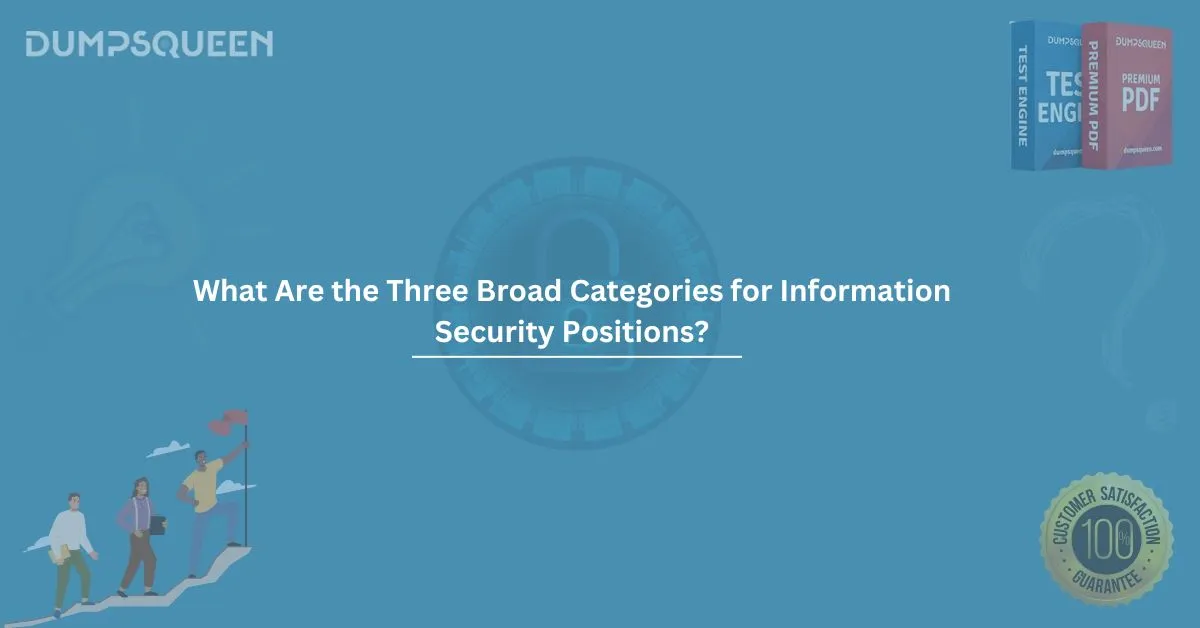In the ever-evolving digital landscape, information security has become a cornerstone of any organization’s IT infrastructure. As the demand for secure data environments increases, so does the need for skilled professionals in the field of information security. A common question many students and professionals preparing for IT certifications ask is:
“What are the three broad categories for information security positions? (choose three.)”
This question is often seen in certification exams, cybersecurity training, and interviews related to IT roles. In this blog, we’ll break down the three core categories, explain their roles and responsibilities, and offer sample multiple-choice questions with answers to help you prepare better. Whether you're just starting your career in cybersecurity or planning to move up the ladder, understanding these categories is crucial.
Why Information Security Matters
Before diving into the categories, let’s highlight the importance of information security. The core purpose of information security is to protect the confidentiality, integrity, and availability (CIA) of data. As cyber threats continue to grow in sophistication, businesses must ensure they have dedicated professionals managing security at every level—from policy development to technical enforcement.
This has led to the creation of various roles across different areas of expertise, which are grouped into three primary categories.
What Are the Three Broad Categories for Information Security Positions? (Choose Three.)
The three main categories of information security positions are:
- Operational
- Technical
- Managerial
Let’s explore each of these categories in more detail.
1. Operational Security Positions
Operational information security positions focus on the day-to-day security operations within an organization. These roles ensure that the policies, guidelines, and controls are properly implemented and maintained.
Common Job Titles:
- Security Analyst
- Compliance Officer
- Risk Analyst
- SOC (Security Operations Center) Staff
- Incident Responder
Key Responsibilities:
- Monitoring systems for suspicious activity
- Enforcing organizational security policies
- Managing security incidents
- Conducting audits and assessments
- Collaborating with other teams to ensure compliance
Certifications that Align:
- CompTIA Security+
- Certified Information Systems Auditor (CISA)
- Certified in Risk and Information Systems Control (CRISC)
2. Technical Security Positions
Technical roles deal with the actual technologies and systems that support information security. These professionals are hands-on, developing, implementing, and maintaining security tools and infrastructure.
Common Job Titles:
- Security Engineer
- Network Security Specialist
- Penetration Tester (Ethical Hacker)
- Security Architect
- Malware Analyst
Key Responsibilities:
- Configuring and managing firewalls, IDS/IPS, antivirus tools
- Performing vulnerability assessments and penetration testing
- Developing secure code and applications
- Troubleshooting and patching security flaws
- Designing secure network architectures
Certifications that Align:
- Certified Ethical Hacker (CEH)
- Offensive Security Certified Professional (OSCP)
- Cisco Certified CyberOps Associate
- CompTIA CySA+
3. Managerial Security Positions
Managerial security roles are focused on the strategic and policy-level aspects of cybersecurity. These positions require leadership, risk management, and decision-making skills rather than hands-on technical knowledge.
Common Job Titles:
- Chief Information Security Officer (CISO)
- Information Security Manager
- Security Program Manager
- Governance, Risk, and Compliance (GRC) Manager
Key Responsibilities:
- Developing organizational security policies
- Managing teams of security professionals
- Allocating resources and budgets for security initiatives
- Reporting to executives and boards
- Overseeing compliance with industry standards and regulations
Certifications that Align:
- Certified Information Security Manager (CISM)
- Certified Information Systems Security Professional (CISSP)
- Certified in Governance of Enterprise IT (CGEIT)
How These Categories Work Together
Though these three categories have distinct focuses, they work in tandem to protect an organization from cyber threats.
- A managerial role may set the direction and prioritize threats.
- A technical role will implement the necessary controls.
- An operational role will monitor and maintain the implemented systems.
Each category is a building block of a strong, unified cybersecurity strategy. Understanding the distinction and synergy between them is key to developing a successful career in information security.
Career Path Recommendations
Understanding the three categories allows professionals to choose a career path that aligns with their interests and strengths.
- If you enjoy hands-on work and problem-solving, technical roles are for you.
- If you're passionate about maintaining compliance and enforcing policies, operational roles are ideal.
- If you're a strategic thinker with leadership abilities, managerial roles offer exciting challenges.
You can also move between categories as you gain more experience. For example, a technical security engineer might grow into a managerial CISO role over time.
Final Thoughts
The question "what are the three broad categories for information security positions? (choose three.)" is more than just an exam item—it's a roadmap to understanding the professional landscape of cybersecurity. Each category plays a vital role in the overall security of any organization.
Whether you're preparing for your next certification exam or planning your career in information security, knowing these categories will help you build the skills and strategies necessary for success.
At DumpsQueen Official, we offer comprehensive study guides, real exam questions, and practice tests to help you master questions like these. Prepare smart. Prepare with DumpsQueen.
Free Sample Questions:
Here are some practice questions to test your knowledge of this topic.
Question 1:
What are the three broad categories for information security positions? (Choose three.)
A. Operational
B. Legal
C. Technical
D. Managerial
E. Financial
Correct Answers: A, C, D
Question 2:
Which of the following job roles typically falls under the technical category of information security positions?
A. Risk Analyst
B. Penetration Tester
C. CISO
D. Compliance Officer
Correct Answer: B. Penetration Tester
Question 3:
A person managing information security policies and overseeing a team of analysts is likely working in which category?
A. Operational
B. Technical
C. Managerial
D. Support
Correct Answer: C. Managerial
Question 4:
Which of the following certifications is best aligned with an operational role in cybersecurity?
A. OSCP
B. CISA
C. CEH
D. CISSP
Correct Answer: B. CISA



